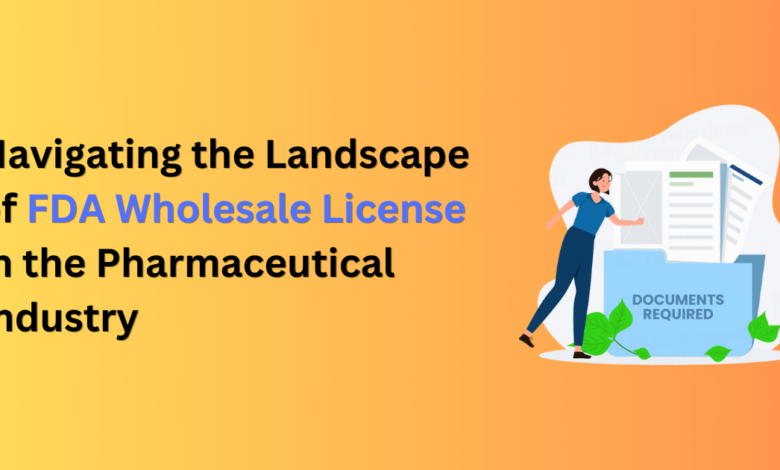The Landscape of FDA Wholesale License in the Pharmaceutical Industry

Introduction
The dynamic realm of the pharmaceutical and healthcare sector in India, regulatory adherence is paramount to ensuring the quality, safety, and efficacy of medicinal products. At the forefront of this regulatory oversight is the Food and Drug Administration (FDA) in India, playing a pivotal role in safeguarding public health and maintaining the integrity of the pharmaceutical supply chain.
Central to the distribution of pharmaceutical products in India is the FDA Wholesale License, a key authorization for entities engaged in wholesale activities within the pharmaceutical sector. This article embarks on a comprehensive exploration of the FDA Wholesale License in the Indian context, offering insights into its fundamental requirements, application processes, and the evolving regulatory landscape that businesses must navigate.
Understanding FDA and Its Regulatory Authority
The Food and Drug Administration (FDA) in India stands as a cornerstone in the regulatory framework of the pharmaceutical and healthcare industry. Operating under the aegis of the Ministry of Health and Family Welfare, the FDA plays a pivotal role in upholding the standards of safety, efficacy, and quality of pharmaceutical products across the country. Here’s a closer look at the FDA’s regulatory authority and its key functions:
I. Regulatory Mandate:
A. Scope of Authority: The FDA’s regulatory authority extends to drugs, medical devices, cosmetics, and food products.
B. Public Health Focus: At the core of its mission is the protection and enhancement of public health through rigorous regulatory oversight.
II. Key Functions:
A. Product Approval: The FDA evaluates and approves new drugs, medical devices, and healthcare products before they are introduced to the market.
B. Regulatory Compliance: Ensuring adherence to established standards and guidelines, fostering a culture of compliance within the industry.
C. Inspections and Audits: Conducting regular inspections of manufacturing facilities to ensure compliance with Good Manufacturing Practices (GMP) and other quality standards.
III. Role in Pharmaceutical Distribution:
A. Supply Chain Integrity: The FDA plays a crucial role in maintaining the integrity of the pharmaceutical supply chain.
B. Licensing and Approvals: Entities involved in wholesale distribution must obtain licenses and approvals from the FDA, ensuring regulatory oversight.
IV. FDA Wholesale License:
A. Regulating Wholesale Distribution: The FDA Wholesale License is a key instrument through which the FDA oversees and regulates wholesale distribution activities.
B. Authorization Criteria: Entities engaged in wholesale distribution of pharmaceutical products must obtain the FDA Wholesale License, adhering to regulatory standards.
V. Regulatory Compliance Requirements:
A. Good Distribution Practices (GDP): The FDA emphasizes the importance of adhering to Good Distribution Practices to ensure the quality and safety of pharmaceutical products during distribution.
B. License Maintenance: Entities holding an FDA Wholesale License must consistently meet regulatory standards, encompassing proper storage, transportation, and reporting practices.
FDA Wholesale License: Basics and Requirements
The FDA Wholesale License serves as a cornerstone for entities engaged in the wholesale distribution of pharmaceutical products in India. This section navigates through the fundamental aspects of the FDA Wholesale License, shedding light on its definition, scope, and the essential requirements for entities seeking this pivotal authorization.
I. Definition and Scope of FDA Wholesale License:
A. Defining Wholesale Distribution: The FDA Wholesale License is a regulatory authorization granted to entities involved in the wholesale distribution of pharmaceutical products.
B. Scope of Activities: Entities holding this license play a crucial role in the distribution chain, ensuring that pharmaceutical products reach various points in the market efficiently and safely.
II. Types of Businesses Requiring FDA Wholesale License:
A. Wholesale Distributors: Entities engaged in the wholesale distribution of pharmaceutical products, including wholesalers, distributors, and trading firms.
B. Third-Party Logistics Providers: Businesses providing logistics services related to the storage and transportation of pharmaceutical products.
III. Regulatory Requirements for Obtaining FDA Wholesale License:
A. Application Process: Entities seeking the FDA Wholesale License must undergo a formal application process with the regulatory authorities.
B. Documentation Requirements: The application typically requires comprehensive documentation, including details about the business, infrastructure, and key personnel.
C. Compliance with Good Distribution Practices (GDP): Applicants must demonstrate adherence to Good Distribution Practices, ensuring the quality and safety of pharmaceutical products during distribution.
IV. Eligibility Criteria:
A. Infrastructure Requirements: Entities must have adequate infrastructure, including storage facilities, to meet regulatory standards.
B. Qualified Personnel: Ensuring that the organization has qualified personnel with the necessary expertise in pharmaceutical distribution.
C. Financial Stability: Demonstrating financial stability and reliability to sustain wholesale distribution activities.
V. Application Process for FDA Wholesale License:
A. Submission of Application: Entities submit a comprehensive application to the regulatory authority, providing detailed information about their operations.
B. Review and Evaluation: The regulatory body reviews the application, evaluating the business’s adherence to regulatory requirements.
C. Approval and Issuance: Upon successful review, the FDA Wholesale License is approved and issued to the entity.
VI. Regulatory Compliance and License Maintenance:
A. Adherence to Good Distribution Practices (GDP): Continuous compliance with GDP is imperative to maintain the FDA Wholesale License.
B. Record-Keeping and Reporting: Entities must maintain accurate records and promptly report any deviations or incidents to the regulatory authorities.
C. Inspections and Audits: The regulatory body may conduct periodic inspections to ensure ongoing compliance with regulatory standards.
Application Process for FDA Wholesale License
Obtaining an FDA Wholesale License in India involves a structured application process that demands meticulous attention to detail. This section provides a step-by-step guide, elucidating the key stages entities must navigate to secure this crucial authorization for wholesale distribution of pharmaceutical products.
I. Preparation Phase:
A. Readiness Assessment: Conduct an internal assessment to ensure the business meets the eligibility criteria and has the necessary infrastructure and expertise for wholesale distribution.
B. Documentation Gathering: Compile all required documents, including details about the business, key personnel, infrastructure, and financial stability.
II. Engagement with Regulatory Authorities:
A. Pre-Submission Meeting: Consider scheduling a pre-submission meeting with the regulatory authorities to clarify any queries and ensure a smooth application process.
B. Understanding Regulatory Requirements: Gain a comprehensive understanding of the specific requirements outlined by the regulatory body for the FDA Wholesale License.
III. Application Submission:
A. Complete Application Form: Fill out the FDA Wholesale License application form accurately, providing all required information.
B. Document Submission: Submit the compiled set of documents, including business details, infrastructure specifications, qualifications of key personnel, and financial stability proofs.
IV. Application Review and Evaluation:
A. Initial Screening: The regulatory authority conducts an initial screening to ensure that the submitted application is complete and complies with basic requirements.
B. Comprehensive Evaluation: A detailed evaluation follows, scrutinizing the application against regulatory standards, including Good Distribution Practices (GDP).
V. Inspection and Verification:
A. Site Inspection: Regulatory authorities may conduct an on-site inspection of the business premises to verify the declared infrastructure and operational processes.
B. Compliance Verification: Ensure that the business adheres to GDP and other regulatory standards during the inspection.
VI. Approval and License Issuance:
A. Review Committee Decision: The application is reviewed by a committee within the regulatory body.
B. Approval Decision: Upon successful review, the regulatory body approves the application.
C. License Issuance: The FDA Wholesale License is issued to the entity, granting authorization for wholesale distribution activities.
VII. Post-License Compliance:
A. Adherence to Good Distribution Practices (GDP): Ensure continuous compliance with GDP, maintaining the highest standards in pharmaceutical distribution.
B. Record-Keeping: Maintain accurate records of all distribution activities and transactions.
C. Reporting Obligations: Comply with reporting obligations, promptly notifying regulatory authorities of any deviations or incidents.
VIII. Ongoing Compliance Management:
A. Regular Audits: Be prepared for periodic audits by regulatory authorities to verify ongoing compliance.
B. Updating Regulatory Changes: Stay informed about changes in regulatory requirements and adjust business practices accordingly.
IX. Renewal Process:
A. Timely Renewal: Ensure timely renewal of the FDA Wholesale License as per regulatory guidelines.
B. Submission of Renewal Application: Submit a renewal application, providing updated information about the business and compliance status.
Role of Good Distribution Practices (GDP) in FDA Wholesale License
Good Distribution Practices (GDP) play a pivotal role in ensuring the quality, safety, and integrity of pharmaceutical products throughout the distribution chain. For entities holding an FDA Wholesale License in India, adherence to GDP is not just a regulatory requirement; it is a fundamental commitment to maintaining the highest standards in pharmaceutical distribution. This section explores the indispensable role of GDP in achieving and sustaining compliance with an FDA Wholesale License.
I. Definition of Good Distribution Practices (GDP):
A. Ensuring Product Integrity: GDP encompasses a set of guidelines and standards designed to ensure the integrity of pharmaceutical products during distribution.
B. Regulatory Framework: GDP is often aligned with regulatory requirements and international standards to guarantee consistency and reliability.
II. Key Components of Good Distribution Practices (GDP):
A. Storage Conditions: Specifying proper storage conditions, including temperature and humidity controls, to prevent degradation of pharmaceutical products.
B. Transportation Standards: Outlining criteria for the transportation of pharmaceuticals, ensuring that products are handled and transported under suitable conditions.
C. Quality Management Systems: Implementing robust quality management systems to track and trace products, enabling rapid response to deviations and recalls.
III. Importance for FDA Wholesale License Holders:
A. Product Safety: Adhering to GDP is crucial for maintaining the safety of pharmaceutical products during storage, transportation, and distribution.
B. Regulatory Compliance: Compliance with GDP is a regulatory requirement for entities holding an FDA Wholesale License in India.
C. Consumer Protection: By following GDP, wholesale distributors contribute to safeguarding the health and well-being of consumers.
IV. Ensuring Compliance with GDP:
A. Personnel Training: Providing comprehensive training to personnel involved in the distribution process to ensure awareness and understanding of GDP principles.
B. Regular Audits: Conducting internal audits to assess and verify compliance with GDP requirements.
C. Documentation and Record-Keeping: Maintaining accurate records of all distribution activities, including storage conditions and transportation details.
V. Impact on Product Quality and Efficacy:
A. Preventing Product Degradation: GDP helps prevent factors such as exposure to incorrect temperatures, light, or moisture that could lead to product degradation.
B. Reducing Risks of Counterfeiting: Rigorous adherence to GDP minimizes the risks of counterfeit products entering the supply chain, enhancing overall product safety.
VI. Consequences of Non-Compliance with GDP:
A. Regulatory Sanctions: Non-compliance with GDP can result in regulatory sanctions, including warnings, fines, or suspension of the FDA Wholesale License.
B. Product Recalls: Failure to adhere to GDP may necessitate product recalls, impacting the reputation of the distributor and potentially harming consumers.
VII. Continuous Improvement and Adaptation:
A. Staying Abreast of Changes: Wholesale distributors must stay informed about evolving GDP guidelines and adapt their practices accordingly.
B. Feedback Mechanisms: Implementing feedback mechanisms to continuously improve distribution processes and address any deviations promptly.
VIII. Collaboration with Supply Chain Partners:
A. Ensuring Chain-wide Compliance: Collaborating with manufacturers, logistics partners, and other stakeholders to ensure end-to-end compliance with GDP.
B. Shared Responsibility: Recognizing that GDP is a shared responsibility across the entire supply chain, emphasizing the importance of collaboration.
Conditions and Responsibilities of FDA Wholesale License Holders
Entities holding an FDA Wholesale License in India shoulder significant responsibilities to ensure the quality, safety, and integrity of pharmaceutical products as they traverse the distribution chain. Compliance with specific conditions and adherence to defined responsibilities are paramount. This section delineates the key conditions and responsibilities that FDA Wholesale License holders must fulfill to maintain regulatory compliance and contribute to a robust pharmaceutical supply chain.
I. Infrastructure and Operations:
A. Storage Facilities: Maintain adequate storage facilities equipped with temperature and humidity controls as per regulatory requirements.
B. Transportation Practices: Adhere to standards for the transportation of pharmaceuticals, ensuring products are handled and transported under suitable conditions.
C. Security Measures: Implement security measures to safeguard pharmaceutical products from theft, tampering, or any form of unauthorized access.
II. Compliance with Good Distribution Practices (GDP):
A. GDP Adherence: Comply with Good Distribution Practices to guarantee the quality and safety of pharmaceutical products during storage and distribution.
B. Personnel Training: Ensure personnel are trained in GDP principles to understand and implement best practices throughout the distribution process.
III. Record-Keeping and Documentation:
A. Accurate Records: Maintain accurate and up-to-date records of all distribution activities, including storage conditions, transportation details, and any deviations.
B. Record Accessibility: Ensure that records are accessible for regulatory inspections and audits.
IV. Reporting Obligations:
A. Deviation Reporting: Promptly report any deviations from standard operating procedures, including incidents affecting product quality or safety.
B. Incident Reporting: Report any incidents, such as product recalls or adverse reactions, to regulatory authorities as required.
V. Regulatory Compliance:
A. License Renewal: Timely renew the FDA Wholesale License as per regulatory guidelines to ensure continuous authorization for distribution activities.
B. Regulatory Updates: Stay informed about changes in regulatory requirements and adjust business practices accordingly.
VI. Product Traceability and Recall Procedures:
A. Traceability Systems: Implement traceability systems to facilitate the rapid and accurate tracking of pharmaceutical products throughout the supply chain.
B. Recall Procedures: Have robust procedures in place for initiating and executing product recalls if necessary, ensuring swift and effective response.
Inspections and Audits by FDA
Inspections and audits conducted by the Food and Drug Administration (FDA) are crucial mechanisms to ensure compliance with regulatory standards and verify the adherence of wholesale license holders to Good Distribution Practices (GDP). This section outlines the key aspects of inspections and audits that entities holding an FDA Wholesale License in India may undergo.
I. Purpose of Inspections and Audits:
A. Regulatory Compliance: Verify that wholesale license holders comply with regulatory requirements, including the conditions stipulated for FDA Wholesale License.
B. GDP Adherence: Assess adherence to Good Distribution Practices to ensure the quality, safety, and integrity of pharmaceutical products during distribution.
II. Types of Inspections and Audits:
A. Routine Inspections: Regularly scheduled inspections conducted by regulatory authorities to assess ongoing compliance with regulatory standards.
B. Surprise Inspections: Unannounced inspections carried out without prior notice to evaluate the immediate state of compliance and uncover potential issues.
III. Inspection Process:
A. Notification: Wholesale license holders may be notified in advance for routine inspections, but surprise inspections typically involve no prior notification.
B. Scope Definition: The regulatory authority outlines the scope and objectives of the inspection, specifying the areas to be scrutinized.
C. On-Site Visit: Inspectors visit the business premises to assess infrastructure, operations, documentation, and adherence to GDP.
IV. Elements Evaluated During Inspections:
A. Storage Conditions: Verify that storage facilities meet the required conditions, including temperature and humidity controls.
B. Transportation Practices: Assess transportation processes to ensure the proper handling of pharmaceutical products during transit.
C. Documentation and Record-Keeping: Review records to confirm accurate documentation of distribution activities, including storage and transportation details.
V. Audits Conducted by FDA:
A. Comprehensive Assessment: Audits involve a thorough examination of wholesale license holders’ operations, from infrastructure to personnel training.
B. GDP Compliance: Evaluate adherence to Good Distribution Practices, focusing on aspects such as storage, transportation, and quality management systems.
Benefits of Holding an FDA Wholesale License
Obtaining an FDA Wholesale License in India is a pivotal step for entities engaged in the wholesale distribution of pharmaceutical products. This license, issued by the Food and Drug Administration, comes with several benefits that contribute to the integrity of the pharmaceutical supply chain and the overall health and safety of consumers. Here are the key advantages of holding an FDA Wholesale License:
I. Legal Authorization:
A. Regulatory Compliance: Holding an FDA Wholesale License ensures compliance with the regulatory framework, demonstrating that the entity meets the prescribed standards for wholesale distribution.
II. Quality Assurance:
A. Adherence to Good Distribution Practices (GDP): The license mandates adherence to Good Distribution Practices, ensuring that pharmaceutical products are handled, stored, and transported under suitable conditions to maintain their quality and efficacy.
B. Product Integrity: By following GDP, entities contribute to the preservation of the integrity of pharmaceutical products, reducing the risks of contamination, degradation, or tampering.
III. Consumer Safety:
A. Product Safety: The license signifies a commitment to product safety, safeguarding consumers from potential risks associated with substandard or counterfeit pharmaceuticals.
B. Traceability: Holding an FDA Wholesale License encourages the implementation of traceability systems, enabling quick and accurate tracking of products throughout the distribution chain.
IV. Market Credibility:
A. Trust and Confidence: Entities with an FDA Wholesale License gain trust and confidence from manufacturers, healthcare providers, and consumers, as it serves as an official endorsement of their commitment to quality and compliance.
B. Market Access: The license is often a prerequisite for engaging with reputable manufacturers and suppliers, facilitating smoother market access for the distribution of pharmaceuticals.
V. Regulatory Recognition:
A. Recognition by Regulatory Authorities: The license is recognized by regulatory authorities and demonstrates that the wholesale distributor has met the necessary criteria, simplifying interactions with regulatory bodies.
B. Ease of Compliance: Having an FDA Wholesale License streamlines the process of compliance with changing regulatory requirements, as license holders are expected to stay abreast of updates.
VI. Operational Efficiency:
A. Efficient Distribution: Compliance with regulatory standards and GDP enhances operational efficiency in the distribution process, reducing the likelihood of disruptions or incidents.
B. Competitive Advantage: Entities with an FDA Wholesale License may gain a competitive edge, as the license signals a commitment to quality that can set them apart in the market.
VII. Risk Mitigation:
A. Reduced Legal and Financial Risks: Holding an FDA Wholesale License reduces the legal and financial risks associated with non-compliance, as entities are expected to adhere to prescribed standards to maintain their license.
B. Product Recalls: The license helps in implementing effective recall procedures, mitigating risks in the event of product recalls or safety concerns.
VIII. Continuous Improvement:
A. Feedback Mechanism: Interactions with regulatory authorities, inspections, and audits provide a feedback mechanism that facilitates continuous improvement in distribution practices.
B. Adaptability: License holders are better positioned to adapt to changes in industry best practices and regulatory requirements, fostering a culture of continuous learning and enhancement.
Conclusion
The FDA Wholesale License is a cornerstone in the pharmaceutical distribution ecosystem. Businesses in the industry must not only navigate the regulatory landscape but also stay informed about recent developments. This article underscores the importance of the FDA Wholesale License in ensuring the continued delivery of safe and effective pharmaceutical products to consumers. As the regulatory landscape evolves, businesses must remain vigilant to uphold the highest standards in pharmaceutical distribution.
Read More – How Far in Advance Should I Request Online Nursing Assignment Help






